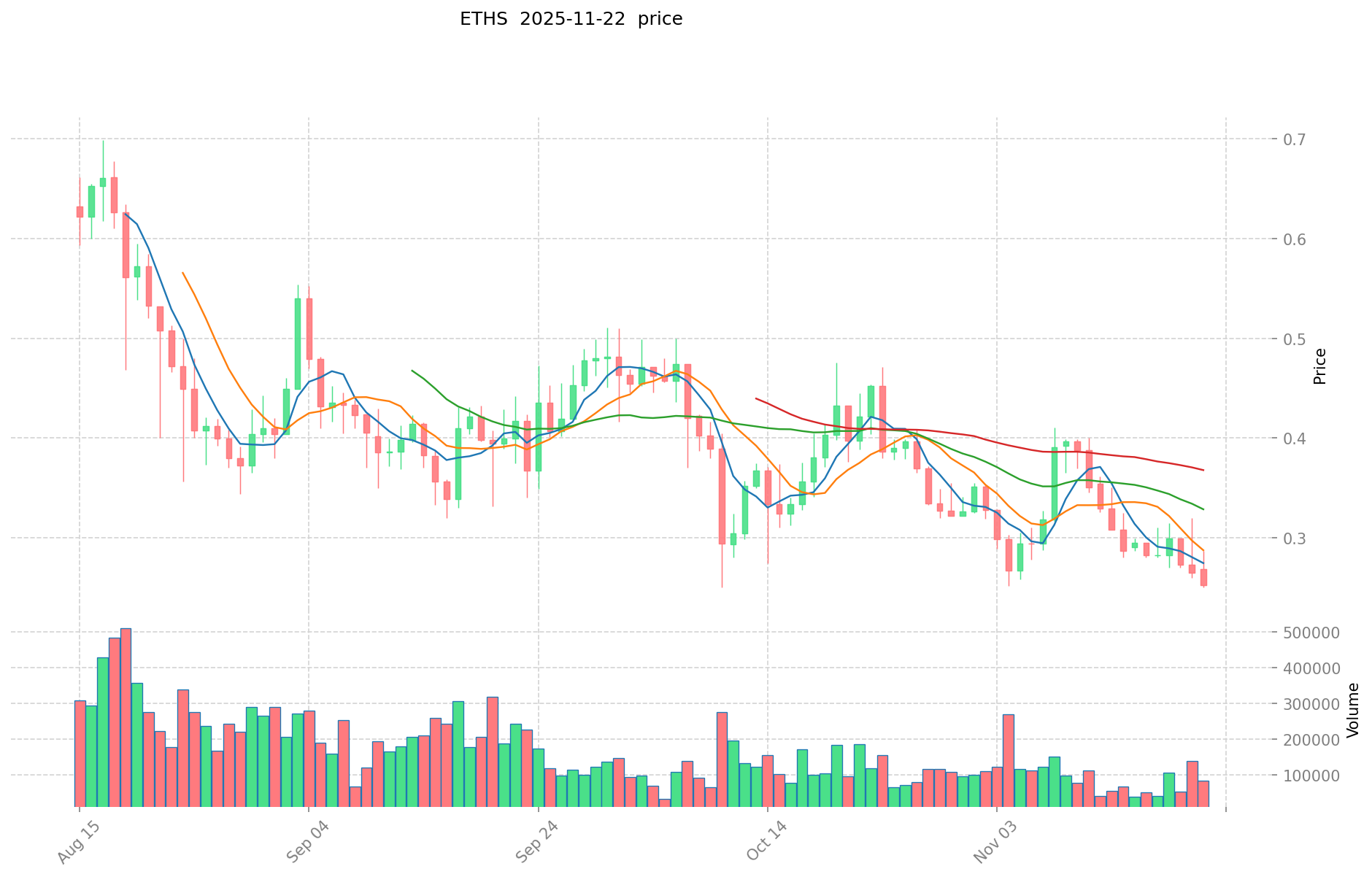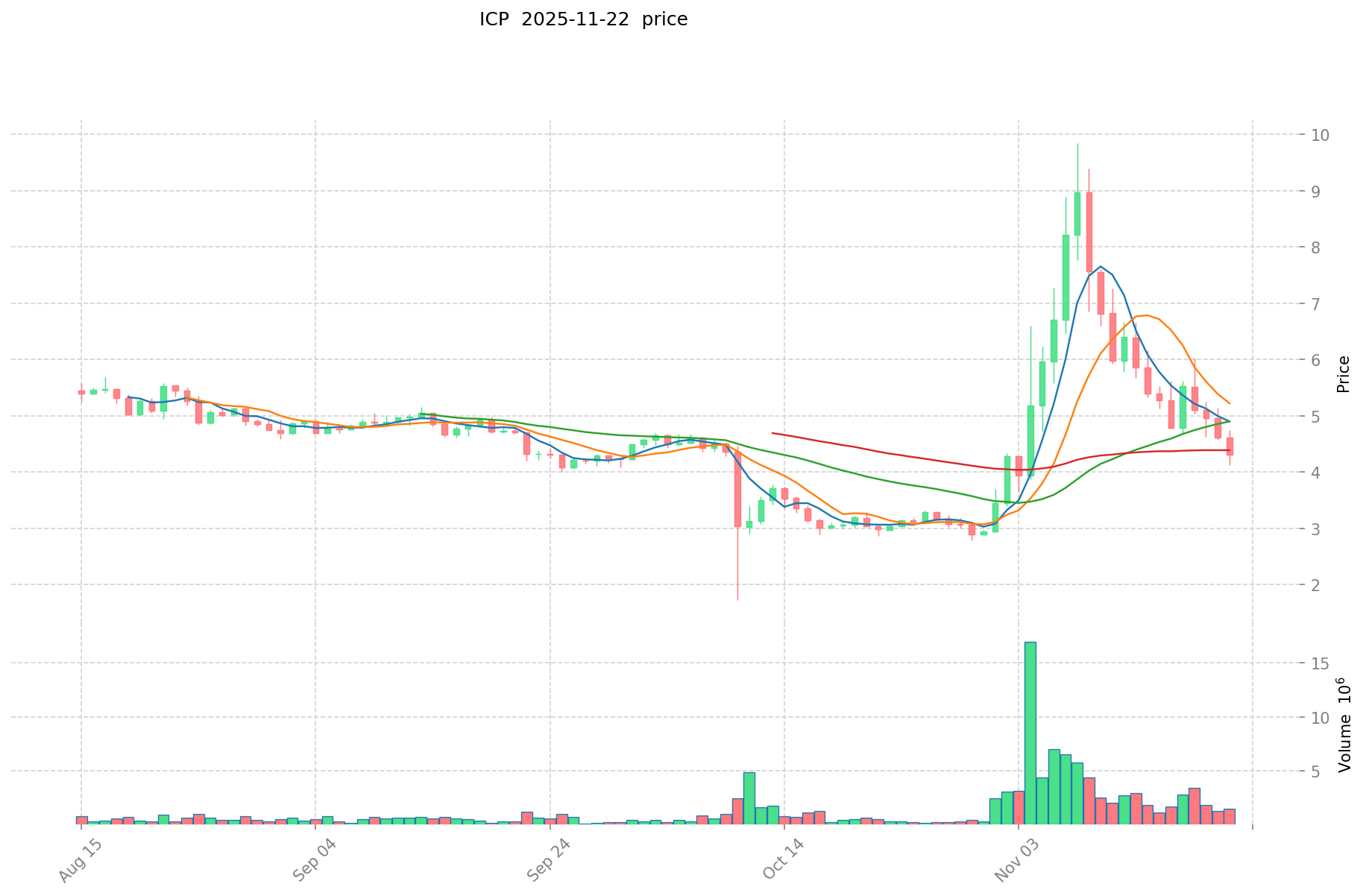ETHS vs ICP: Comparing Ethereum Staking and Internet Computer Protocol for Decentralized Applications
Introduction: ETHS vs ICP Investment Comparison
In the cryptocurrency market, the comparison between ETHS and ICP has been an unavoidable topic for investors. The two not only show significant differences in market cap ranking, application scenarios, and price performance but also represent different positions in the crypto asset landscape.
ETHS (ETHS): Launched as the core asset of Facet, a decentralized Ethereum L1 scaling protocol recognized and funded by the Ethereum Foundation.
Internet Computer (ICP): Introduced in 2021 as a decentralized cloud blockchain, it has been hailed for its ability to host secure and resilient applications, websites, and enterprise systems.
This article will comprehensively analyze the investment value comparison between ETHS and ICP, focusing on historical price trends, supply mechanisms, institutional adoption, technological ecosystems, and future predictions, attempting to answer the question investors care about most:
"Which is the better buy right now?"
I. Price History Comparison and Current Market Status
ETHS and ICP Historical Price Trends
- 2024: ETHS reached its all-time high of $13.9 on January 5, 2024.
- 2025: ETHS hit its all-time low of $0.079 on April 7, 2025.
- Comparative Analysis: Over the past year, ETHS has experienced a significant decline, dropping 83.09% from its peak.
Current Market Situation (2025-11-23)
- ETHS current price: $0.235
- ICP current price: $4.082
- 24-hour trading volume: ETHS $28,793.96 vs ICP $3,497,708.33
- Market Sentiment Index (Fear & Greed Index): 11 (Extreme Fear)
Click to view real-time prices:
- Check ETHS current price Market Price
- Check ICP current price Market Price


II. Key Factors Affecting Investment Value of ETHS vs ICP
Supply Mechanisms Comparison (Tokenomics)
- ETHS: Fixed supply model with 120 million tokens in total; transition from PoW to PoS with ETH 2.0 has created deflationary pressure through token burning
- ICP: Declining supply schedule with long-term release plans; utilizes cycles for computation with automatic burning mechanism in the network
- 📌 Historical pattern: Fixed or deflationary supply models (like ETHS) tend to create upward price pressure during bull markets, while ICP's more complex tokenomics may create less immediate scarcity effects
Institutional Adoption and Market Applications
- Institutional holdings: ETHS has gained significant institutional adoption through ETFs and corporate treasuries, while ICP has more limited institutional presence
- Enterprise adoption: ETHS leads in DeFi infrastructure and payment systems; ICP focuses on enterprise web hosting and decentralized applications with its Internet Computer protocol
- Regulatory attitudes: ETHS has clearer regulatory status in many jurisdictions; ICP faces more regulatory uncertainty due to its governance structure
Technology Development and Ecosystem Building
- ETHS technical upgrades: ETH 2.0 transition improving scalability and reducing energy consumption; layer-2 solutions expanding transaction capacity
- ICP technical development: Chain-key technology enabling web speed and unlimited capacity; reverse gas model where developers pay for users' computation
- Ecosystem comparison: ETHS dominates in DeFi applications, NFT marketplaces, and has broader developer adoption; ICP offers unique fully on-chain applications but with smaller developer community
Macroeconomic Factors and Market Cycles
- Performance during inflation: ETHS has demonstrated some store-of-value properties during inflation periods; ICP lacks sufficient historical data
- Monetary policy effects: Both assets show sensitivity to interest rates and USD strength, with ETHS demonstrating more stable correlation patterns
- Geopolitical factors: ETHS has more global distribution and trading volume, providing better liquidity during geopolitical uncertainty
III. 2025-2030 Price Prediction: ETHS vs ICP
Short-term Prediction (2025)
- ETHS: Conservative $0.2254 - $0.2324 | Optimistic $0.2324 - $0.2858
- ICP: Conservative $2.3461 - $4.1160 | Optimistic $4.1160 - $4.3630
Mid-term Prediction (2027)
- ETHS may enter a growth phase, with an estimated price range of $0.1714 - $0.3968
- ICP may enter a bullish market, with an estimated price range of $3.8976 - $6.5922
- Key drivers: Institutional capital inflow, ETF, ecosystem development
Long-term Prediction (2030)
- ETHS: Base scenario $0.3893 - $0.4580 | Optimistic scenario $0.4580 - $0.4946
- ICP: Base scenario $5.0948 - $6.9792 | Optimistic scenario $6.9792 - $9.9803
Disclaimer: This analysis is for informational purposes only and should not be considered as financial advice. Cryptocurrency markets are highly volatile and unpredictable. Always conduct your own research before making any investment decisions.
ETHS:
| 年份 | 预测最高价 | 预测平均价格 | 预测最低价 | 涨跌幅 |
|---|---|---|---|---|
| 2025 | 0.2858397 | 0.23239 | 0.2254183 | -1 |
| 2026 | 0.3757165325 | 0.25911485 | 0.1787892465 | 10 |
| 2027 | 0.3967696140625 | 0.31741569125 | 0.171404473275 | 35 |
| 2028 | 0.449936742346875 | 0.35709265265625 | 0.210684665067187 | 51 |
| 2029 | 0.512463665826984 | 0.403514697501562 | 0.282460288251093 | 71 |
| 2030 | 0.494628316197415 | 0.457989181664273 | 0.389290804414632 | 94 |
ICP:
| 年份 | 预测最高价 | 预测平均价格 | 预测最低价 | 涨跌幅 |
|---|---|---|---|---|
| 2025 | 4.36296 | 4.116 | 2.34612 | 0 |
| 2026 | 5.3841396 | 4.23948 | 2.6708724 | 3 |
| 2027 | 6.592179426 | 4.8118098 | 3.897565938 | 17 |
| 2028 | 5.93007439752 | 5.701994613 | 4.44755579814 | 39 |
| 2029 | 8.142448307364 | 5.81603450526 | 3.7222620833664 | 42 |
| 2030 | 9.98031521102616 | 6.979241406312 | 5.09484622660776 | 70 |
IV. Investment Strategy Comparison: ETHS vs ICP
Long-term vs Short-term Investment Strategies
- ETHS: Suitable for investors focused on DeFi infrastructure and Ethereum ecosystem growth
- ICP: Suitable for investors interested in decentralized cloud computing and enterprise blockchain solutions
Risk Management and Asset Allocation
- Conservative investors: ETHS: 60% vs ICP: 40%
- Aggressive investors: ETHS: 70% vs ICP: 30%
- Hedging tools: Stablecoin allocation, options, cross-currency portfolios
V. Potential Risk Comparison
Market Risks
- ETHS: High correlation with overall crypto market sentiment, susceptible to Ethereum ecosystem developments
- ICP: Lower liquidity and higher volatility, potentially more affected by project-specific news
Technical Risks
- ETHS: Scalability challenges, network congestion during high demand periods
- ICP: Centralization concerns, potential security vulnerabilities in the Internet Computer protocol
Regulatory Risks
- Global regulatory policies may have different impacts on both assets, with ETHS potentially facing more scrutiny due to its wider adoption
VI. Conclusion: Which Is the Better Buy?
📌 Investment Value Summary:
- ETHS advantages: Established ecosystem, institutional adoption, deflationary mechanism
- ICP advantages: Unique technology proposition, potential for enterprise adoption, scalability
✅ Investment Advice:
- Novice investors: Consider a higher allocation to ETHS due to its more established market position
- Experienced investors: Balanced portfolio with both ETHS and ICP, adjusting based on risk tolerance
- Institutional investors: ETHS for more conservative positions, ICP for diversification and potential high growth
⚠️ Risk Warning: Cryptocurrency markets are highly volatile. This article does not constitute investment advice. None
VII. FAQ
Q1: What are the main differences between ETHS and ICP? A: ETHS is the core asset of Facet, an Ethereum L1 scaling protocol, while ICP is a decentralized cloud blockchain. ETHS has a fixed supply of 120 million tokens and is more established in DeFi, while ICP has a declining supply schedule and focuses on enterprise web hosting and decentralized applications.
Q2: Which cryptocurrency has shown better price performance recently? A: Based on the current market data, ICP is trading at a higher price ($4.082) compared to ETHS ($0.235). However, ETHS has experienced a significant decline of 83.09% from its all-time high, while ICP's performance varies.
Q3: How do the supply mechanisms of ETHS and ICP differ? A: ETHS has a fixed supply model with 120 million tokens and uses a deflationary mechanism through token burning. ICP has a declining supply schedule with long-term release plans and uses an automatic burning mechanism tied to network computation.
Q4: Which cryptocurrency has better institutional adoption? A: ETHS has gained more significant institutional adoption through ETFs and corporate treasuries, while ICP has more limited institutional presence.
Q5: What are the key technological differences between ETHS and ICP? A: ETHS is undergoing the ETH 2.0 transition to improve scalability and reduce energy consumption. ICP uses chain-key technology enabling web speed and unlimited capacity, with a reverse gas model where developers pay for users' computation.
Q6: How do the long-term price predictions for ETHS and ICP compare? A: For 2030, ETHS is predicted to reach $0.3893 - $0.4946 in optimistic scenarios, while ICP is predicted to reach $5.0948 - $9.9803. However, these predictions are speculative and should be approached with caution.
Q7: What are the main risks associated with investing in ETHS and ICP? A: ETHS faces risks related to market sentiment, scalability challenges, and potential regulatory scrutiny. ICP risks include lower liquidity, higher volatility, centralization concerns, and potential security vulnerabilities in its protocol.
Share
Content